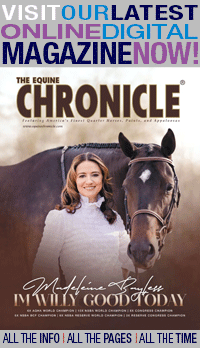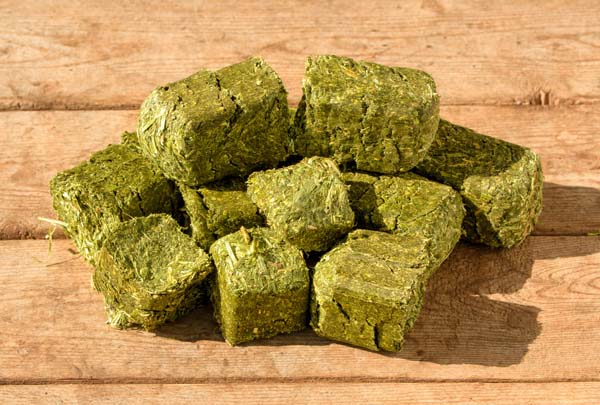FDA Cautions Horse Owners Not to Feed Recalled Lots of Top of the Rockies Alfalfa Cubes
December 17, 2022
FDA Cautions Horse Owners Not to Feed Recalled Lots of Top of the Rockies Alfalfa Cubes Due to Reports of Illness and Death
FDA, in cooperation with state departments of agriculture in CO, LA, NM, and TX, is investigating cases of illness and death in horses.
Fast Facts
- The U.S. Food and Drug Administration is cautioning horse owners not to feed Top of the Rockies alfalfa cubes with the date codes 111222, 111322, 111422, 111522, and 111622.
- These alfalfa cubes have been recalled by Manzanola Feeds of Manzanola, CO, which distributes products directly to feed stores and co-ops in 10 states. Further distribution is possible, so it’s important to check the date codes if you have these products.
- Top of the Rockies alfalfa cubes are sold in white and tan plastic 50-pound bags with green labeling. The date codes are on the front of the package.
- If you have Top of the Rockies alfalfa cubes with these date codes, or you can’t be sure of the date code of the products you have, throw them away in a secure container and follow the handling and cleaning instructions below.
- FDA is aware of at least 98 horses in Colorado, Louisiana, New Mexico, and Texas who showed neurologic symptoms. At least 45 of these horses have died or were euthanized due to declining health.
- The symptoms reported are consistent with botulism, and while further testing is underway to pinpoint the cause of the horse illnesses, horse owners and handlers should take precautions to protect human and animal health.
- Immediately consult a veterinarian if your horse ate this product and shows signs of neurologic illness, such as muscle tremors, difficulty eating or swallowing, difficulty standing, or collapse.
What is the problem?
The U.S. FDA is cautioning horse owners not to feed recalled Top of the Rockies alfalfa cubes with the date codes 111222, 111322, 111422, 111522, and 111622. Some of the alfalfa cubes have been reported to contain what appears to be fur and animal tissues, indicating that material from an animal or animals may have been incorporated into the cubes during alfalfa harvesting. Some people have reported a foul odor in some of the bags. Clostridium botulinum, the bacterium that causes botulism, is commonly present in decaying animal carcasses. Testing of the alfalfa cubes and other feed and tissue samples is in progress.
These alfalfa cubes were made by Manzanola Feeds of Manzanola, CO, and FDA has confirmed the firm distributes products to feed stores and co-ops in 10 states: AR, CO, IL, KS, LA, MO, NM, OK, TX, and WI. Further distribution may be possible, so it’s important to check the date code if you have this product.
FDA is aware of several horses in Colorado, Louisiana, New Mexico, and Texas who showed neurologic symptoms, and is working with state authorities to learn more. At least 45 of these horses have died or were euthanized due to declining health. Necropsies of some of the horses are underway or pending. At this time, it appears that Top of the Rockies alfalfa cubes was the only common food source among all of the cases.
This is an ongoing investigation and FDA will share additional information as it becomes available.
What do I need to do?
If you have Top of the Rockies alfalfa cubes with the date codes 111222, 111322, 111422, 111522, or 111622, or you can’t be sure of the date code of the products you have, do not feed them to your horses or any other animals. Throw them away in a secure container and place them in a covered trash can or dumpster so that no other animals can access them. Avoid handling the cubes directly and wear disposable gloves and a face mask while throwing the cubes away and cleaning any bins or containers where they were kept.
- Wearing gloves and a face mask (preferable an N95 respirator), clean out all the empty bins or containers where the alfalfa cubes were kept.
- Make a bleach solution by combining ¼ cup household bleach to every 2 cups of water.
- Completely cover the container with the bleach solution, place a layer of paper towels on top of the bleach, and let sit for at least 15 minutes.
- Wipe up any remaining liquid with new paper towels and let the containers air dry.
- Clean the area with liquid soap and water to remove the bleach and discard any items that may have come into contact with the contaminated food or containers.
- Dispose of the face mask and gloves in a secure trash receptacle and wash your hands with soap and running water for at least 2 minutes.
What symptoms have been reported?
Attending veterinarians and state officials have reported that horses have shown symptoms of neurologic illness, including muscle tremors that rapidly progressed to the whole body, weakness, decreased tongue tone, agitation, and inability to stand. If you see these symptoms in your horse, seek immediate veterinary care.
These symptoms are consistent with botulism and many horses have been treated for suspected botulism. No human illnesses have been reported to date.
How can I report a horse illness?
If you think your horse has become ill after eating contaminated food, call your veterinarian first. You can also report the illness to FDA through the Safety Reporting Portal or by calling your state’s FDA Consumer Complaint Coordinators. If possible, share the brand name and lot numbers of what your horse ate.











